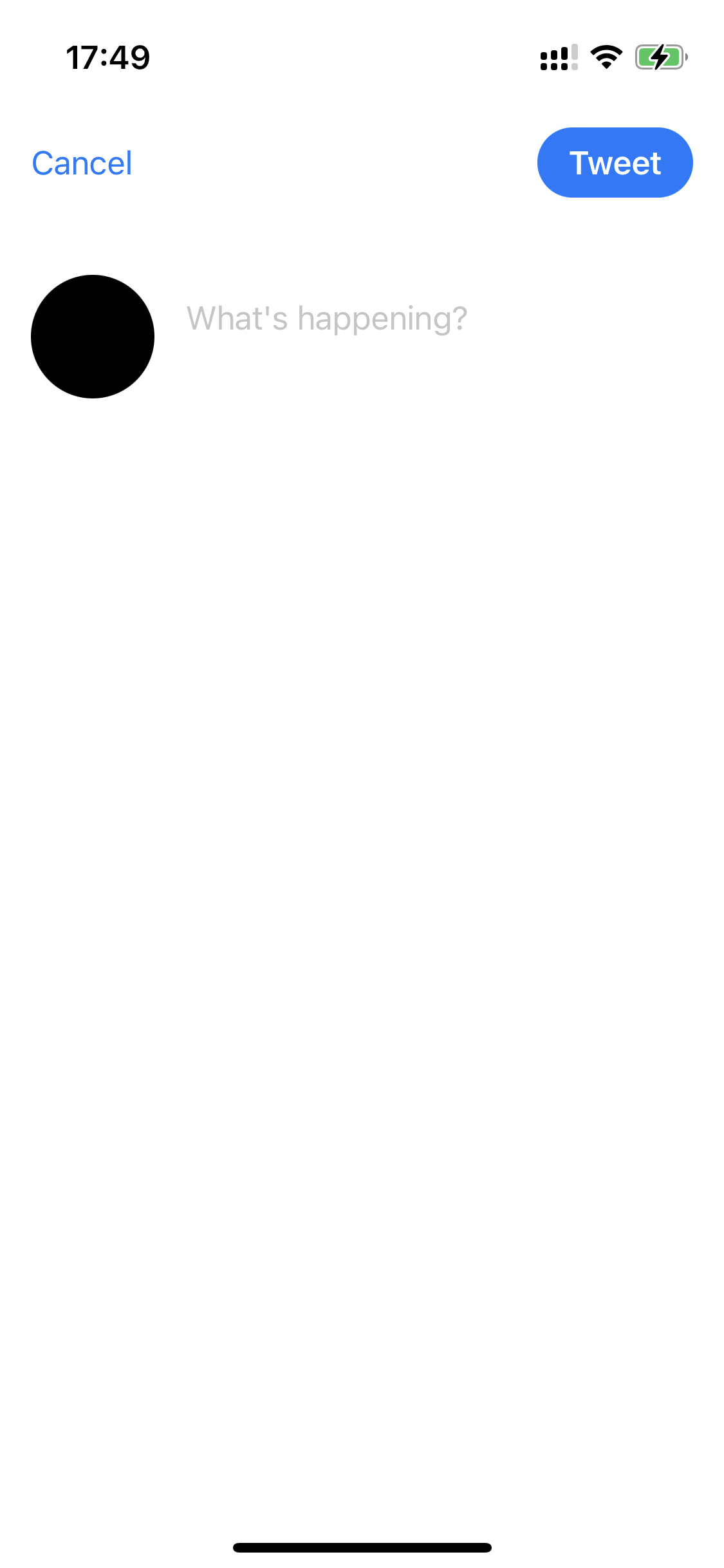기본 UI 구성하기 #6
FloatingButton & NewTweetView
FloatingButton

메인 화면 어디서든 새 글을 작성할 수 있도록 FeedView 위에 표시되는 FloatingButton을 생성한다.
Source
struct FeedView: View {
var body: some View {
ZStack(alignment: .bottomTrailing) {
ScrollView {
LazyVStack {
ForEach(0 ... 20, id: \.self) { _ in
TweetRowView()
.padding()
}
}
}
Button {
print("this is Floating Button Function")
} label: {
Image("tweet")
.resizable()
.renderingMode(.template)
.frame(width: 28, height: 28)
.padding()
}
.background(Color(.systemBlue))
.foregroundColor(.white)
.clipShape(Circle())
.padding()
}
}
}FeedView를 담당하는 ScrollView를 ZStack에 Embed 하고 Button을 디자인해 추가하기만 하면 된다.
Action은 추구 NewTweetView를 연결할 수 있도록 표시만 해 둔다.
NewTweetView


NewTweetView는 새 Tweet를 작성하는 화면이다.
상단에 취소 버튼과 Tweet 버튼이 존재하고,
그 아래로 프로필 사진과 글을 작성할 TextEditor가 존재한다.
Source
struct NewTweetView: View {
@State private var caption = ""
@Environment(\.dismiss) var dismiss
var body: some View {
VStack {
HStack {
Button {
dismiss()
} label: {
Text("Cancel")
.foregroundColor(Color(.systemBlue))
}
Spacer()
Button {
print("tweet")
} label: {
Text("Tweet")
.bold()
.foregroundColor(.white)
.padding(.horizontal)
.padding(.vertical, 8)
.background(Color(.systemBlue))
.clipShape(Capsule())
}
}
.padding()
HStack(alignment: .top) {
Circle()
.frame(width: 64, height: 64)
TextArea("What's happening?", text: $caption)
}
.padding()
}
}
}VStack으로 버튼과 아래의 영역을 나누고,
프로필 사진과 TextEditor를 나란히 표시하기 위해 HStack을 한 번 더 사용한다.
TextEditor에 해당하는 TextArea는 State 변수인 caption을 Binding 파라미터로 전달하게 된다.
NewTweetView
| TextArea

Source
struct TextArea: View {
@Binding var text: String
let placeholder: String
init(_ placeholder: String, text: Binding<String>) {
self.placeholder = placeholder
self._text = text
UITextView.appearance().backgroundColor = .clear
}
var body: some View {
ZStack(alignment: .topLeading) {
TextEditor(text: $text)
.padding(4)
if text.isEmpty {
Text(placeholder)
.foregroundColor(Color(.placeholderText))
.padding(.horizontal, 8)
.padding(.vertical, 12)
}
}
.font(.body)
}
}TextArea는 파라미터로 전달된 파라미터를 업데이트한다.
별 특별해 보일 것 없어 보이는 이 코드에 약간의 트릭이 숨겨져 있다.
ZStack(alignment: .topLeading) {
TextEditor(text: $text)
.padding(4)
if text.isEmpty {
Text(placeholder)
.foregroundColor(Color(.placeholderText))
.padding(.horizontal, 8)
.padding(.vertical, 12)
}
}
.font(.body)바로 이 부분이다.
UIKit과 다르게 SwiftUI의 TextEditor는 현재까지도 Placeholder를 지원하지 않는다.
따라서 TextEditor의 내용에 대해 분기해서 Placeholder를 대신하는 TextView를 표시하거나,
TextEditor를 표시하는 방식으로 Placeholder를 구현한다.
이 경우 Placeholder 대신 표시된 TextView가 TextEditor의 위에 위치하므로,
TextView의 영역을 터치하면 TextEditor가 반응하지 않는다.
해당 이벤트에 대해 TextEditor로 Responder를 옮겨주는 방식을 구현해 조금 더 나은 사용자 경험을 만들 수 있다.
이 부분은 이후에 추가할 수 있도록 하겠다.

위와 같이 TextEditor에 내용이 생기게 되면 TextView 위에 TextEditor가 표시되면서
자연스럽게 하나의 View처럼 동작한다.
FloatingButton에 연결하기
Source
struct FeedView: View {
var body: some View {
ZStack(alignment: .bottomTrailing) {
ScrollView {
LazyVStack {
ForEach(0 ... 20, id: \.self) { _ in
TweetRowView()
.padding()
}
}
}
Button {
print("this is Floating Button Function")
} label: {
Image("tweet")
.resizable()
.renderingMode(.template)
.frame(width: 28, height: 28)
.padding()
}
.background(Color(.systemBlue))
.foregroundColor(.white)
.clipShape(Circle())
.padding()
}
}
}앞서 작성한 FloatingButton의 코드이다.
struct FeedView: View {
@State private var showNewTweetView = false
var body: some View {
ZStack(alignment: .bottomTrailing) {
ScrollView {
LazyVStack {
NewTweetView를 표시할 수 있도록 SideMenu와 같이 Trigger의 역할을 할 State 변수가 필요하다.
Button {
showNewTweetView.toggle()
} label: {
Image("tweet")
.resizable()
.renderingMode(.template)
.frame(width: 28, height: 28)
.padding()
}FloatingButton을 눌렀을 때 이 상태를 변화시키면 된다.
NewTweetView를 표시하는 방식은 두 가지가 있다.
fullScreen과 sheet 방식인데 선언 방식은 다음과 같다.
//FullScreen
.fullScreenCover(isPresented: $showNewTweetView) {
NewTweetView()
}
//Sheet
.sheet(isPresented: $showNewTweetView) {
NewTweetView()
}Binding으로 방금 선언했던 State 변수를 전달하면 된다.
Button {
showNewTweetView.toggle()
} label: {
Image("tweet")
.resizable()
.renderingMode(.template)
.frame(width: 28, height: 28)
.padding()
}
.background(Color(.systemBlue))
.foregroundColor(.white)
.clipShape(Circle())
.padding()
.fullScreenCover(isPresented: $showNewTweetView) {
NewTweetView()
}선언 위치는 위와 같다.


각각의 결과는 위와 같다.
'프로젝트 > Twitter Clone App (w∕Firebase)' 카테고리의 다른 글
| 08. 기본 UI 구현하기 #8 (0) | 2022.12.02 |
|---|---|
| 07. 기본 UI 구성하기 #7 (0) | 2022.12.02 |
| 05. 기본 UI 구성하기 #5 (0) | 2022.11.30 |
| 04. 기본 UI 구성하기 #4 (0) | 2022.11.24 |
| 03. 기본 UI 구성하기 #3 (0) | 2022.11.23 |



